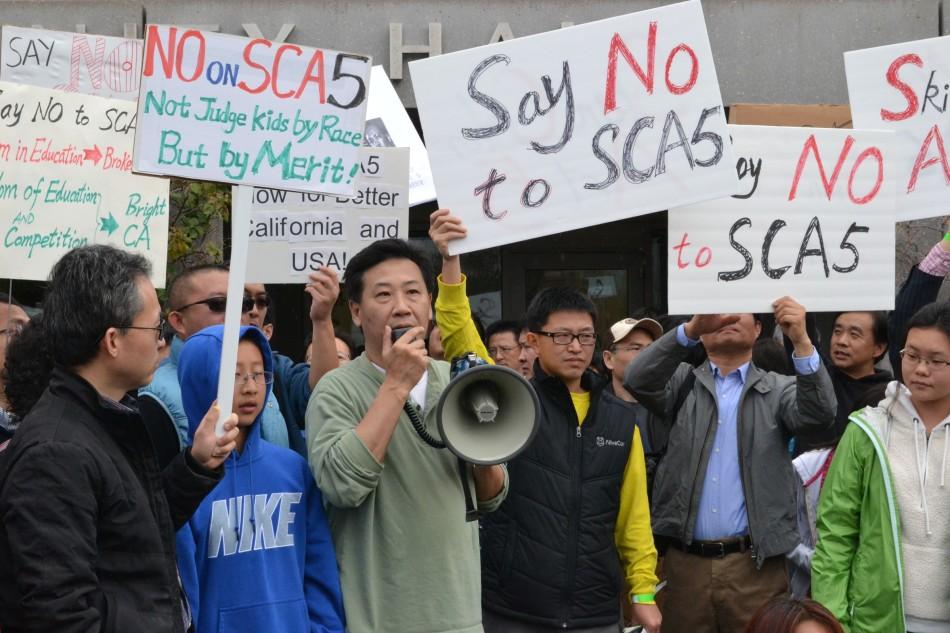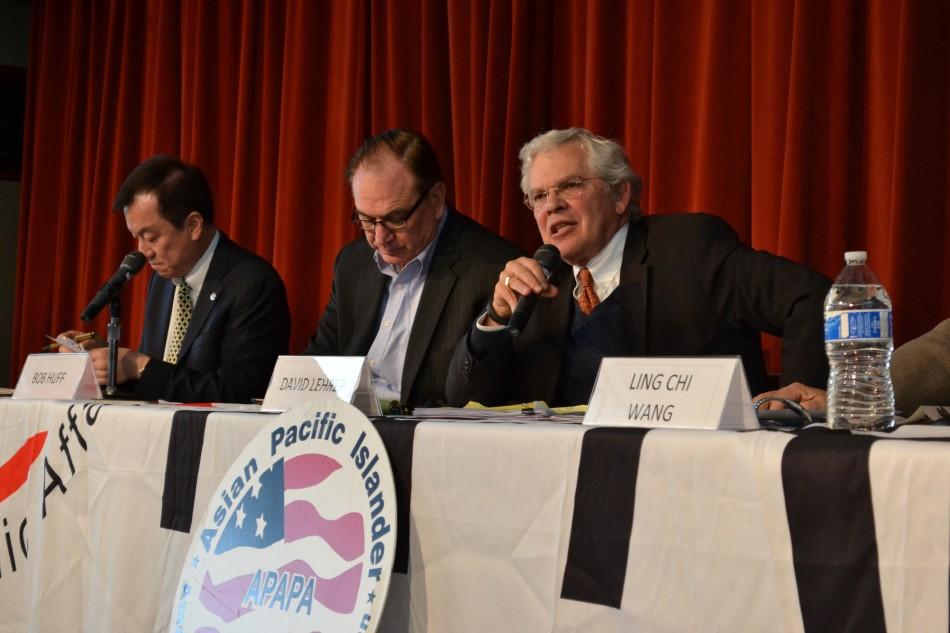Community protests SCA-5 at Cupertino library
Several volunteers conducted a protest of the SCA-5 amendment outside the Cupertino library.
Bay Area community leaders and members gathered on March 2 to discuss Senate Constitutional Amendment 5, which would allow California’s public universities to consider race as a factor in admissions. While several volunteers conducted a protest of the amendment outside the Cupertino library, a panel of four politicians and experts debated the issue inside the Community Hall.
Panelists included Bob Huff, State Senate Republican Leader; Lin-chi Wang, past chair of the Ethnic Studies department at the University of California, Berkeley; David Lehrer, President of Community Advocates; and Henry Der, past Deputy Superintendent of the California Department of Education. The panel gave the speakers the opportunity to explain their individual views of SCA-5 to the audience.
“The question that you need to answer is do you want to hold your elected officials accountable, as we have the opportunity to do, living in a democracy, or do you want some nameless bureaucrat or committee making the decisions?” Huff said. “Do you want [admissions] based on merit, when you’ve had your children working after school, when you’ve had them studying while others are out playing […] do you want it based on merit and their scores, or do you want it based on some other unnamed, unaccountable committee or person?”
State Senator Ed Hernandez proposed the amendment to address “a precipitous drop in the percentage of Latino, African American and Native American students at California public universities.”
“I think the intentions are all very nice with regard to SCA-5, but it begs the question because it really is a solution in search of a problem. […] It would be a terrible message to go back to the quotas and preferences as they once existed in California,” Lehrer said.
If passed, the amendment would effectively reverse the prohibition by Proposition 209 of considering racial factors in higher public education. Also known as the California Civil Rights Initiative, the proposition has covered the government institutions involved in public employment, public contracting, and public post-secondary education since its approval in 1996.
While several protesters expressed concern that removal of this protection would instate racial quotas, Der hoped that the amendment could be improved to reflect its true intentions, which in his view does not involve the implementation of such quotas.
“For what I can see in the amendment, […] the intent was to recruit and to admit students throughout California under the U.S. Constitution with all the U.S. Supreme Court decisions and as the other panel members have stated, the U.S. Supreme Court does not allow quotas to be applied in university admissions at UCs and CSUs,” he said.
He called further attention to the lack of funding facing all of California public education.
“What I find to be the real problem with university admission is not the fight between Asians and blacks and Latinos and whites for a limited number of admissions to UCs,” he said. “The problem today is our California politicians, and ultimately the California public, do not want to invest enough money to support the UCs and the CSUs.”
Many predict that the amendment will lower the percentage of Asian Americans accepted to UCs and CSUs.
“I think it’s fair to curve out Asians because we’re benefiting from the whole education system structure, so we’re basically the majority in this case,” Archana Podury (11) said, “but I am not sure if grouping it by race is the right thing to do. It should be by economic status.”
Resistance to what many protesters have deemed “Skin Color Act 5” has occurred through several grassroots movements throughout the state as well as two online petitions. Two days before the protest at the Cupertino library, people in Southern California gathered in front of the office building of state assembly member Ed Chau to urge him to vote against SCA-5.
In the midst of this opposition and media coverage, Wang cautions against the potential implications that debate over the amendment can have for race relations in the state.
“We really have to think carefully. Race is a very, very touchy, politically emotionally charged thing in our society, and it could be easily triggered into some hysterical movement,” he said.
Jean Wei arrived at the protest to show her opposition to what she believes will bring down the long-run performance of California’s graduates.
“The overall college performance will come down, and it’s going to affect [areas] other than education, so later the career and other impacts. From California, it’s going to go to other states,” she said. “It’s going to affect the future of our country.”
Several candidates for city and state office attended the debate as invited VIPs.
“I think [the panel] only [is] attacking the surface problems. There are so many other problems. There’s education of kids from ages one through the end—that’s what’s missing,” said Gregory Wade, candidate for Oakland mayor.
The amendment was passed by the State Senate on Jan. 30 and is currently awaiting a decision in the Assembly. To be stopped in the Democratic-dominated assembly, the amendment needs all the Republican votes and two Democratic votes against it.
Huff believes opposition to the amendment in the assembly can surpass party lines.
“Every assembly member is up for election this year, so those that are in districts where the Asian vote will make a difference, they’ll think twice before they cast a vote for SCA-5 on the assembly floor,” he said.
If approved, the amendment could go on a ballot for decision by the voting public.
“I really feel like there could be an opportunity by the [Democratic party] to make this a racial issue, to pit the Hispanic community or the African American community against the Chinese or Indian communities” said George Yang, candidate for lieutenant governor. “I think that’s very unfortunate, and I think that that’s one reason why this law should be stopped in the state assembly and not go forward.”
The petition on change.org to stop SCA-5 has 110,659 signatures and needs 89,341, as of 11:24 a.m. on March 14.
This piece was originally published in the pages of the Winged Post on March 12, 2014

Kacey Fang (12) is the Managing Editor for The Winged Post. She has been part of the journalism program since freshman year and served as Features Editor...


















![“[Building nerf blasters] became this outlet of creativity for me that hasn't been matched by anything else. The process [of] making a build complete to your desire is such a painstakingly difficult process, but I've had to learn from [the skills needed from] soldering to proper painting. There's so many different options for everything, if you think about it, it exists. The best part is [that] if it doesn't exist, you can build it yourself," Ishaan Parate said.](https://harkeraquila.com/wp-content/uploads/2022/08/DSC_8149-900x604.jpg)




![“When I came into high school, I was ready to be a follower. But DECA was a game changer for me. It helped me overcome my fear of public speaking, and it's played such a major role in who I've become today. To be able to successfully lead a chapter of 150 students, an officer team and be one of the upperclassmen I once really admired is something I'm [really] proud of,” Anvitha Tummala ('21) said.](https://harkeraquila.com/wp-content/uploads/2021/07/Screen-Shot-2021-07-25-at-9.50.05-AM-900x594.png)







![“I think getting up in the morning and having a sense of purpose [is exciting]. I think without a certain amount of drive, life is kind of obsolete and mundane, and I think having that every single day is what makes each day unique and kind of makes life exciting,” Neymika Jain (12) said.](https://harkeraquila.com/wp-content/uploads/2017/06/Screen-Shot-2017-06-03-at-4.54.16-PM.png)








![“My slogan is ‘slow feet, don’t eat, and I’m hungry.’ You need to run fast to get where you are–you aren't going to get those championships if you aren't fast,” Angel Cervantes (12) said. “I want to do well in school on my tests and in track and win championships for my team. I live by that, [and] I can do that anywhere: in the classroom or on the field.”](https://harkeraquila.com/wp-content/uploads/2018/06/DSC5146-900x601.jpg)
![“[Volleyball has] taught me how to fall correctly, and another thing it taught is that you don’t have to be the best at something to be good at it. If you just hit the ball in a smart way, then it still scores points and you’re good at it. You could be a background player and still make a much bigger impact on the team than you would think,” Anya Gert (’20) said.](https://harkeraquila.com/wp-content/uploads/2020/06/AnnaGert_JinTuan_HoHPhotoEdited-600x900.jpeg)

![“I'm not nearly there yet, but [my confidence has] definitely been getting better since I was pretty shy and timid coming into Harker my freshman year. I know that there's a lot of people that are really confident in what they do, and I really admire them. Everyone's so driven and that has really pushed me to kind of try to find my own place in high school and be more confident,” Alyssa Huang (’20) said.](https://harkeraquila.com/wp-content/uploads/2020/06/AlyssaHuang_EmilyChen_HoHPhoto-900x749.jpeg)




